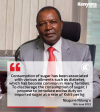BARD AI
JF-Expert Member
- Jul 24, 2018
- 3,377
- 8,121
Kwa mujibu wa Waziri huyo, Matumizi makubwa ya Sukari yamekuwa yakichangia kwa kiasi kikubwa Magonjwa yasiyoambukiza ikiwemo #Kisukari na #Moyo, hivyo ili kupunguza madhara hayo Serikari imependekeza Kodi ya Tsh. 85.25 kwa kila Kilo ya Sukari.
Vipi Mdau, bidhaa gani unadhani ingewekewa Kodi kubwa ili kudhibiti matumizi yake?
===========
Sugar consumers are set for more pain at the shop shelf under the government’s plan to impose an excise duty of Sh5 per kilogramme of imported sugar at a time when a shortage of the commodity has driven prices to highs of Sh210 per kilogramme.
Treasury Cabinet secretary Njuguna Ndung’u said on Thursday in his Budget speech the duty, which would be passed on to the final consumer, is meant to discourage the consumption of sugar on health grounds.
The staple is, however, a constant in almost all homes and is one of the most widely consumed household food products alongside bread, flour, rice and milk.
A global shortage of sugar has led to a spike in prices to about $675.69 (Sh94,400) per tonne, up from $560.46 (Sh78,301) in February.
The Kenyan market is itself facing a shortage that has seen the country’s weekly optimal stock drop by 80 percent on the back of diminished production by factories and expensive imports, pushing up retail prices to a historic high.
“Consumption of sugar has been associated with various ailments such as diabetes, which has become common in many families,” said Prof Ndung’u.
“To discourage consumption of sugar, I propose to the National Assembly to introduce excise duty on imported sugar at the rate of Sh5 per kilogramme, excluding the sugar imported or purchased locally by registered pharmaceutical manufacturers for use in the manufacture of pharmaceutical products.”
The duty would also have applied to local sugar as per the Finance Bill 2023 had the Budget and Finance Committee of the National Assembly not amended the Bill to specify that it would only apply to imported products.
Other household staple products such as rice and wheat were, however, given favourable treatment by the Cabinet secretary in the Budget, through lower duty on imports.
Prof Ndung’u said due to insufficient local production of the two crops, Kenya would be importing rice at a rate of 35 percent, instead of the 75 percent rate agreed under the EAC Common External Tariff.
Wheat imports will also attract a lower duty of 10 percent instead of the 35 percent stipulated under the EAC Duty Remission Scheme.
The importation of wheat will be undertaken upon the recommendation by the Ministry of Agriculture and will ensure wheat millers, as a priority, purchase local wheat before they are allowed to import,” said the CS.
EAC finance ministers in their annual pre-budget consultations meetings also agreed to extend a raft of special duty measures meant to support Kenya’s manufacturing sector.
These include allowing Kenya to continue importing inputs for the manufacture of baby diapers duty-free for one more year, and to also continue charging imported diapers duty at 35 percent for the year to protect local manufacturers.
A similar window for duty-free imports of raw materials and inputs for the manufacture of footwear products and roofing tiles was granted to Kenya, and also for imports of inputs for the manufacture of animal feeds to address the high cost of the product that has contributed to high food prices in the country.
